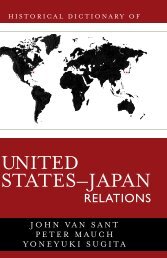Songs of the Righteous Spirit: âMen of High Purposeâ and Their ...
Songs of the Righteous Spirit: âMen of High Purposeâ and Their ...
Songs of the Righteous Spirit: âMen of High Purposeâ and Their ...
Create successful ePaper yourself
Turn your PDF publications into a flip-book with our unique Google optimized e-Paper software.
142 MATTHEW FRALEIGHinspired by Wen’s example, <strong>the</strong> term serves as <strong>the</strong> definitive term associatedwith Wen himself, appearing in line 6 <strong>of</strong> <strong>the</strong> first poem entitled“Composed in prison” by Takasugi, <strong>the</strong> comment from Yoshida Shōinthat Takasugi appended to his second poem <strong>of</strong> <strong>the</strong> same title, <strong>and</strong> <strong>the</strong>poem by Hashimoto Sanai. These shorter poems by <strong>the</strong> Japanese shishithus recapitulate <strong>the</strong> frame in Wen Tianxiang’s “Song” that invokeshistorical analogues as sources <strong>of</strong> inspiration, but at <strong>the</strong> same time displace<strong>the</strong> referential scope to Wen Tianxiang himself. The versions <strong>of</strong>Wen Tianxiang’s “Song” by Yoshida Shōin <strong>and</strong> o<strong>the</strong>rs represent a differentform <strong>of</strong> displacement, one that relocated <strong>the</strong> frame to Japan.Yoshida Shōin’s “Song <strong>of</strong> <strong>the</strong> <strong>Righteous</strong> <strong>Spirit</strong>,” also a “pentasyl labicold-style poem” (Ch. wuyan gushi; J. gogon koshi 五 言 古 詩 ), makes use<strong>of</strong> <strong>the</strong> rhyme characters in Wen Tianxiang’s original. Moreover, as inWen’s “Song,” <strong>the</strong> shifts in Shōin’s rhymes correspond to <strong>the</strong> contours<strong>of</strong> his poem’s semantic content <strong>and</strong> rhetorical strategy, serving to distinguishone structural unit from ano<strong>the</strong>r.和 文 天 祥 正 氣 歌 韻Matching <strong>the</strong> rhymes <strong>of</strong> Wen Tianxiang’s“Song <strong>of</strong> <strong>the</strong> <strong>Righteous</strong> <strong>Spirit</strong>”正 氣 塞 天 地 The righteous spirit pervades Heaven <strong>and</strong> Earth;聖 人 唯 踐 形 Only a sage can completely fulfill it.65其 次 不 朽 者 And after <strong>the</strong> sages come <strong>the</strong> ever-enduring,亦 爭 光 日 星 Who rival <strong>the</strong> sun <strong>and</strong> stars in <strong>the</strong>ir light.5 嗟 吾 小 丈 夫 But, alas! I am a mere man,一 粟 點 蒼 溟 A grain <strong>of</strong> millet floating on <strong>the</strong> dark blue depths.才 疎 身 側 陋 My talents are meager, <strong>and</strong> my station low;雲 路 遙 天 廷 The cloud-path to Court stretches so far away.然 當 其 送 東 Yet when I was sent up to <strong>the</strong> East,10 眼 與 山 水 青 My eyes shone as pure blue as <strong>the</strong> mountains <strong>and</strong>rivers.周 海 泊 舟 處敬 慕 文 臣 筆When our ship anchored on <strong>the</strong> shores <strong>of</strong> Suō,I paid my respects to <strong>the</strong> literary vassal’s brush.6665The allusion is to Mencius VIIA.38: 孟 子 曰 形 色 天 性 也 . 惟 聖 人 然 後 可 以 踐 形 .“Mencius said ‘Our body <strong>and</strong> complexion are given to us by heaven. Only a sage can givehis body complete fulfillment.’” See Mencius, trans. D. C. Lau (Harmondsworth: PenguinBooks, 1970), p. 191.66I believe that <strong>the</strong> “literary vassal” here refers to eminent poet <strong>and</strong> scholar Sugawara













